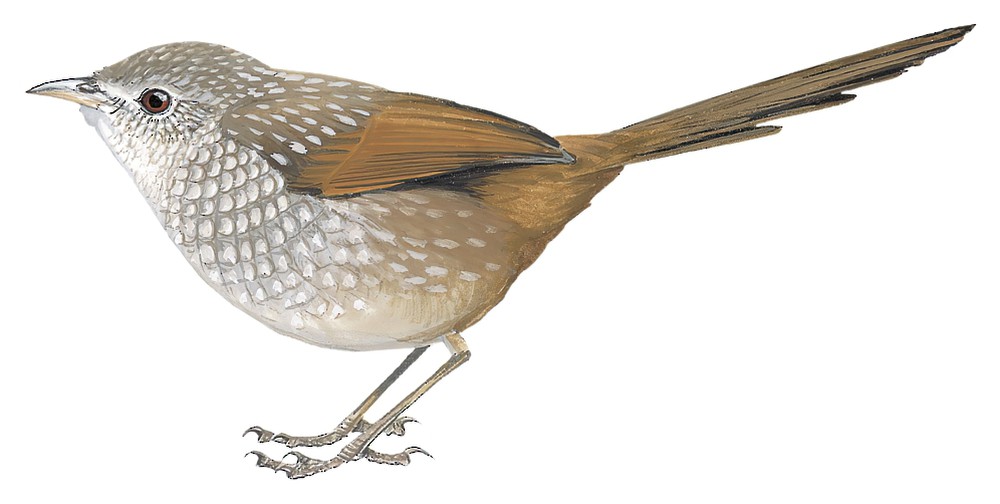Western Bristlebird / Dasyornis longirostris

Western Bristlebird
SCI Name:
Protonym: Dasyornis longirostris Proc.Zool.Soc.London(1840) (1840), Pt8 no.95 p.170
Taxonomy: Passeriformes / Dasyornithidae / Dasyornis
Taxonomy Code: wesbri1
Type Locality: Swan River, southwestern Australia.
Author: Gould
Publish Year: 1841
IUCN Status: Endangered
DEFINITIONS
DASYORNIS
(Dasyornithidae; Ϯ Eastern Bristlebird D. brachyperus) Gr. δασυς dasus hairy; ορνις ornis, ορνιθος ornithos bird; "Genus. DASYORNIS *. Rostrum forte, subarcuatum, culmine carinato, mandibula superiori vix emarginata; naribus basalibus, ovalibus, longitudinalibus, membrana supra partim tectis. Alæ breves, rotundæ: remige prima subbrevi, secunda tertia et quarta gradatim longioribus, quinta sexta et septima fere æqualibus longissimis, cæteris gradatim descrescentibus. Cauda elongata, gradata. Pedes subfortes, mediocres; halluce forti, ungue subelongato, arcuato; acrotarsiis scutellatis, paratarsiis integris. Regio anteocularis vibrissis recumbentibus fortibus instructa. Corporis plumarum pogonia decomposita. This genus bears a very close resemblance to the group of Timalia of the Javanese ornithology. In the shortness and roundness of the wings, in the length and graduation of the tail, in the carinated bill, and in the loose and decomposed feathers of the body, it comes so close to that group that we should at once refer our species to it, were it not for the singular bristles that spring from the front of the forehead above the bill, and form a strongly distinguishing character. ... We have some grounds for thinking that with Timalia it may rather be referred to that place among the Thrushes where the species gradually pass into the Warblers, than to the present situation. At the same time, it shows some resemblance to Megalurus, Horsf., and perhaps to Malurus, Vieill. ... *Δασυς hirsutus, and ορνις avis. ... 1. AUSTRALIS. ... This bird Mr. Caley procured in a scrubby place on the north side of Paramatta. He was able to ascertain nothing of its habits. He calls it in his notes "Bristle Bird." " (Vigors & Horsfield 1827); "Dasyornis Vigors and Horsfield, 1827, Trans. Linn. Soc. London, 15, p. 231. Type, by monotypy, Dasyornis australis Vigors and Horsfield = Turdus brachypterus Latham." (Mayr in Peters, 1986, XI, p. 409).
Var. Dasiornis.
Synon. Maccoyornis, Sittina, Sphenura.
longirostris
L. longus long; -rostris -billed < rostrum beak. Var. Longirostra.
● ex “Long-billed Thrush” of Latham 1783 (‡Acrocephalus).
● ex “Manchot de la Nouvelle Guinée” of Sonnerat 1776 (syn. Aptenodytes patagonicus).
● ex “Troupiale” of d’Aubenton 1765-1781, pl. 532 (syn. Icterus icterus).
● ex “Grimpar Nasican” of Levaillant 1807 (Nasica).
● ex “Râle à long bec de Cayenne” of d’Aubenton 1765-1781, pl. 849, and “Long-billed Rail” of Latham 1785 (Rallus).
Longirostris
(syn. Limnodromus Ϯ Short-billed Dowitcher L. grisea) L. longus long; -rostris
-billed < rostrum beak; "Longirostris is, I think, preferable to Macroramfus [sic] for the genus Longbeak" (C. T. Wood 1836). Var. Longirostra (Wood 1837: "Brown Longbeak. Macroramfe ponctue, - Roth M[acroramfe]. Longirostra grisea, Wood. .. Longbeak, Longirostris, Wood").
UPPERCASE: current genus
Uppercase first letter: generic synonym
● and ● See: generic homonyms
lowercase: species and subspecies
●: early names, variants, mispellings
‡: extinct
†: type species
Gr.: ancient Greek
L.: Latin
<: derived from
syn: synonym of
/: separates historical and modern geographic names
ex: based on
TL: type locality
OD: original diagnosis (genus) or original description (species)












